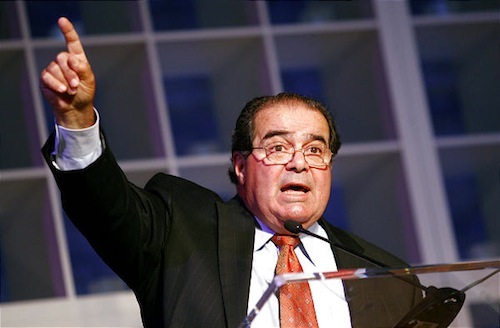Monday in Princeton, Supreme Court Justice Antonin Scalia defended his comparison of anti-sodomy laws to prohibitions against bestiality and murder. Speaking to gay freshman Duncan Hosie—who questioned whether it was appropriate to imply a connection between blowing a dude and shooting the Lone Ranger in order to penetrate his horse—Scalia said that “I don’t think it’s necessary, but I think it’s effective.” See, Justice Scalia only made that argument because it works. “It’s a form of argument that I thought you would have known, which is called the ‘reduction to the absurd,'” he added. “If we cannot have moral feelings against homosexuality, can we have it against murder? Can we have it against other things?” Obviously, the answer is no; if we permit gay marriage, we have to immediately overturn state and federal laws against murder. Differences between that reductio ad absurdum and Scalia’s after the jump.
Over at the New Yorker, Amy Davidson reports Scalia’s argument in all its thorny splendor. Quote:
If we cannot have moral feelings against homosexuality, can we have it against murder? Can we have it against these other things? Of course we can. I don’t apologize for the things I raised. I’m not comparing homosexuality to murder. I’m comparing the principle that a society may not adopt moral sanctions, moral views, against certain conduct. I’m comparing that with respect to murder and that with respect to homosexuality.
Scalia isn’t saying that homosexuality is like murder; he’s just saying that we hate it the way we hate murder. Despite his advertisement, what the Justice has here is not a reduction to absurdity. He’s got a good, old-fashioned straw man. Hosie was not arguing that society had no right to convert moral judgments to law in its opposition to homosexuality; he was saying that Scalia had drawn a false equivalence between (moral sentiment against) being gay and (moral sentiment against) killing somebody.
There are differences in our degree of moral opposition to different acts, in other words, and with certain exceptions—murder and bestiality, for example—what we regard as immoral changes over time. That’s a tough argument to adress, so Scalia went with his reduction to absurdity. He cheated, though. Instead of reducing the principle Hosie put forward to an absurd conclusion, he willfully adopted an absurd interpretation of Hosie’s premise. He ignored both the disagreement over whether homosexuality is morally wrong and the near unanimous agreement that it is not as bad as murder, and instead pretended that Hosie argued against the government’s right to enforce any moral prohibitions whatsoever.
Obviously, he did not. Scalia’s argument—that saying the government should not make one moral prohibition a law implies that it has no moral standing to make any laws—is itself extremely vulnerable to the reductio ad absurdum. Consider the case of Loving v. Virginia, which finally overturned Virginia’s law against interracial marriage. Few would argue today that marriages between people of different races are morally wrong—at least not publicly. Yet the Supreme Court was able to overturn that law without invalidating statutes against homicide and sex with animals.
It’s almost as if the government can sometimes be wrong about what is immoral or, if you prefer, that society’s perception of what is moral changes over time. If, as Scalia insists, you consider the full scope of all laws when considering any moral prohibition, it’s also as if some behaviors—speeding and vandalism, for example—were less morally repugnant than others. All of these are real aspects of laws criminalizing gay relationships that a reasonable person would recognize and take into account. Justice Scalia is surely smart enough to notice them, but for the sake of argument he is willing to adopt the absurd position that they do not exist.
In short, Justice Scalia is a dick. As Davidson points out, his dissents in gay-rights cases have repeatedly used the word “animus,” which is a pleasantly Latinate way to say “hate.” Scalia appears to hate gay people—or, if he prefers, gay acts—to such a degree that he is willing to embrace whatever rhetorical tactics against them are not strictly necessary but effective. As a public advocate for bigotry, he is probably wise to use such tactics. What is the argument against gay marriage, after all, but an appeal to popular prejudices? As a member of the Supreme Court, however, Scalia shows his reasoning on this issue to be disturbing in the extreme. On Friday, the court will hear arguments in two cases related to the federal law against gay Americans to marry. A man who actually believes one law is as good as any other is not qualified to decide such matters. A man who only says that’s what he believes is lying.





I submit that it actually is wrong to make laws based on moral feelings. Our laws can coincide with our morality, but it should be because the supporting reasoning dovetails. Murder produces an instinctual feeling of moral repugnance, but not for the syllogistic reason of, “because it’s immoral,” but rather because it leads to a victim paying the ultimate cost. Similarly, it is illegal because a victim was harmed and as a society we must prevent and punish that.
Even those who claim homosexuality is immoral (usually for religious reasons) have trouble articulating the harm done to a person or to society. We hear a great deal about the devaluation of marriage and other vague claims, but nothing supported with any evidence. Homosexuality harms noone. When there is no tangible cost to society or a person, we should not be legislating.
The most disappointing part of this whole debate is that Scalia has spent his entire career making exactly that case for small government.